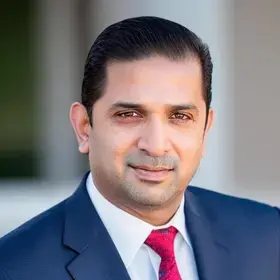Rick Woollams, Chief Claims Officer of structured settlements firm Chronovo and a former executive with AIG and Travelers, graduated from law school and then opened his own law practice. The work turned out to not be as lucrative or interesting as he’d hoped, so he looked to insurance. The insurance professionals he’d encountered in his law practice seemed interesting and happy. Fast forward to today -- Woollams is using the broad experience he gained over the decades working with industry leaders at AIG and Travelers to help make Chronovo one of Inc. Magazine’s “Fastest-Growing Private Companies.” Now, he’s looking forward to sharing his knowledge of claims and its importance to insurance enterprises with students in Columbia’s Insurance Management master's program, launching in Fall 2020.
What excites you about Columbia’s Insurance Management master’s program?
I am an enthusiastic advocate of the importance of the claims function in a property and casualty (P&C) insurance company. When properly designed and led, it can meaningfully advance the company's strategic goals. When managed poorly, it can create a headwind that the company will have to struggle against. Claims executives know this, but executives in other insurance units sometimes don't. Or if they do, they may not appreciate what goes into crafting a claims strategy to suit their company. I hope to use my experience in the P&C business to help students understand and appreciate what the claims function can do for their company.
Did you have a clear idea that you wanted to pursue a career in the insurance early in your career? How did a graduate degree enhance your career?
My post-undergraduate plan was to go to law school, pass the bar, and open my own law practice in my small Ohio hometown. I did that, but I then discovered that such a law practice was both less remunerative and less fun than I thought it was going to be. When I explored other options, I thought about my encounters with the P&C insurance industry, and I realized that I had been impressed by the professionalism of the folks I had interacted with there, and decided to give it a try. Upon doing so, I discovered that the industry was a challenging place to work; I would be able to fully use my skills and benefit from an interesting and rewarding career. Having a law degree was a huge help. The insurance industry refers to people like me as "law-trained," but I had very little formal education that was insurance-focused, so I had to pick that knowledge up on my own along the way. That was hard but rewarding.
I am an enthusiastic advocate of the importance of the claims function in a property and casualty (P&C) insurance company. When properly designed and led, it can meaningfully advance the company's strategic goals. When managed poorly, it can create a headwind that the company will have to struggle against. Claims executives know this, but executives in other insurance units sometimes don't.”
We all know the (inaccurate) cliché that no one at a dinner party wants to be stuck next to accountants or people in the insurance industry. What do you tell people to help them understand how vital and dynamic today’s insurance business is?
Speaking only on behalf of claims, I’d say that claims people have the best stories. They see how everything breaks, how everyone fails, and what the human consequences of those failures are. It’s compelling stuff.
What advice do you have for people in the industry looking to advance their careers? How important is the right mix of on-the-job experience and graduate work to reaching leadership positions in the industry?
The key is to broaden your knowledge base. You can do that by how you manage your career, and you can do that with additional formal education. The more you know, the more valuable you are, both to yourself and your company.
What new sets of skills and types of expertise are now useful or even required to be successful in the industry that may not have been when you were starting out?
Understanding what’s possible with artificial intelligence and analytics has become mandatory. The power of those technologies and techniques is undeniable. Claims is data-rich, and figuring out how to make use of that data is vital. Understanding what behavioral science can tell us is useful as well.
I have been able to work on disputes that ended up on 60 Minutes.”
Can you provide one key takeaway that you hope students in the Insurance Management master’s program will gain from their interactions with you? What kinds of interactions with industry experts does the program provide?
They’ll understand how claims are a key part of the P&C insurance universe — how much potential leverage there is in the claims function. Every unit of the program will be led by an industry expert, so the program offers a chance at knowledge and insights that would otherwise take decades to acquire.
Is there anything that you’ve done in your career that you didn’t expect to be able to or have the opportunity to do when you entered the insurance industry? Are there any experiences you’ve had that are atypical in the industry?
I was able to manage nine-figure disputes through direct discussion with the senior management of Fortune 100 companies. I was able to be part of the strategy discussions where we decided whether and how to make law. And I was able to work on disputes that ended up on 60 minutes. All very cool stuff.


